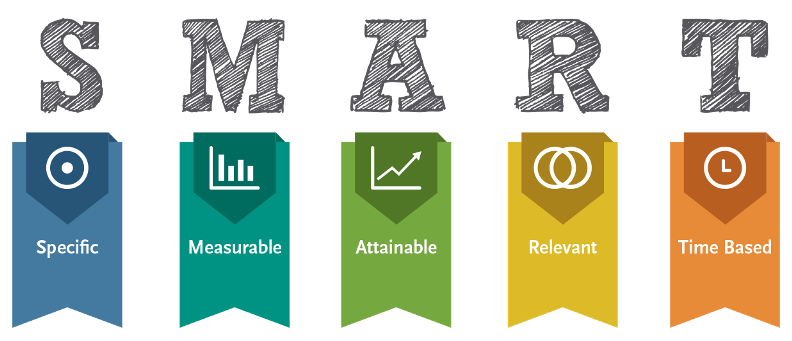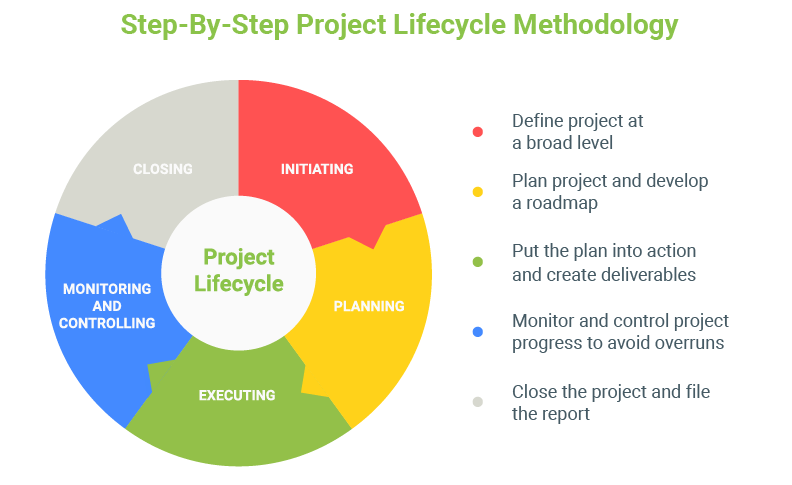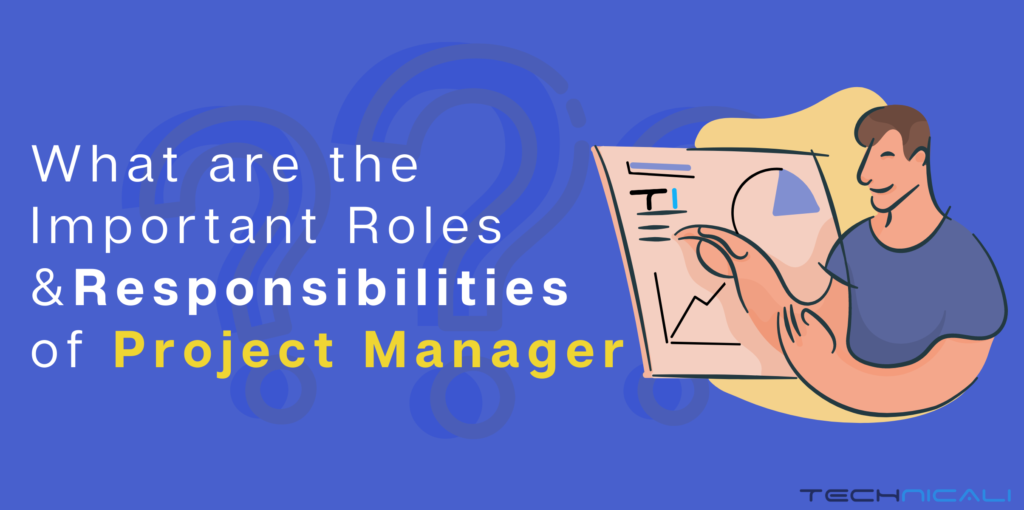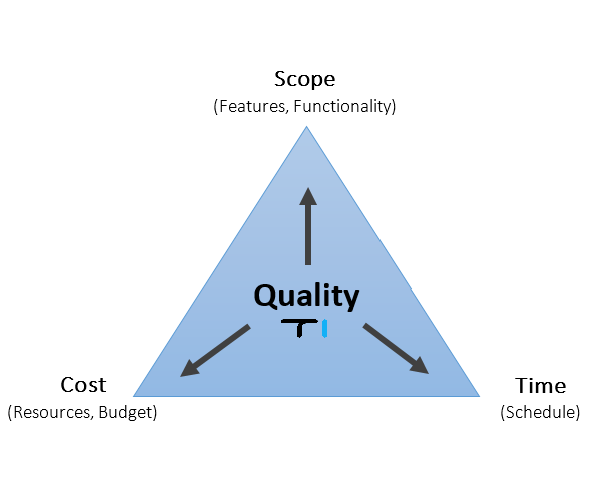Contents
- 1 What is a Project?
- 2 What is Project Management?
- 3 SMART Goals or Objectives of the Project
- 4 What is a Project Life Cycle?
- 5 Who is a Project Manager?
- 6 Roles and Responsibilities of the Project Manager
- 7 Importance of project manager
- 8 Understanding the Golden Triangle of Project Management
- 9 Tools used for Project Management.
- 10 Conclusion
What is a Project?
To answer this question, first, let’s see what project is not. Your everyday tasks such as answering the phone, making coffee, and regular meetings you attend at your work are not projects. They are your Business as Usual (BAU). BAU is any daily activity you do every day to enhance your business.
Projects are an effort made to bring changes in the products or services. It goes on for a specific period. It has a start date and end date for even a prolonged project. If the project never stops then, it is BAU.
Projects are unique activities that ensure changes in the outputs. The outputs are then used by BAU to achieve desired results. This temporary task helps to create a unique product, service, or result.
Examples of the projects are developing a new phone, designing a new marketing campaign, and changing business procedure. Even managing a wedding is considered a project.
Characteristics of the Project
- All projects are unique.
All projects have the aim of achieving a product or service. Some projects may be similar, but the output of every project will be different. No two projects are the same.
- All projects have distinct goals.
The projects have the aim of achieving some goals and objectives. This aim is the central idea with which the project is designed. This aim is different for every project.
- Projects are temporary
All the projects have a finite starting and end date of completion. The projects are bound by time. The start of the project is when the project is instituted and developed. And the end of the project is marked when the project meets its objectives.
- Adequate Resources
In the initial stage of the project, all the resources that would be necessary for the project’s completion are calculated. These resources include time, cost, labour, material, etc. These resources are bought together before the actual start of the project.
What is Project Management?
Project Management is the art and science of getting things done. It is to know what you want to achieve, how you should complete it, and how long it will take to achieve it.
Everyone involved in the project management shares an understanding of the objectives of the project. This understanding should be there from the beginning of the project till the very end.
Projects don’t just happen. They are a masterpiece of planning, organizing, managing, and communicating project ideas and objectives. They are a sequence of activities where the progress is steady and smooth.
It is a continuous activity where one step leads to another. All obstacles and hitches are taken into consideration while planning the project. All the team members involved in the project are highly talented and flexible.
These people have a clear understanding of the roles and responsibilities that they adhere to. And this helps to conclude the project without compromising the time, cost, and quality of the project. Project management is a very complex subject, and to simplify it, there are some famous methodologies available to us.
Though project management is virtually invisible, it is the absence of problems and prevention of failure. Project management helps to complete the project that fulfils all the objectives and goals of the project. It reduces the chances of failure and optimizes the resources available to the organization.
SMART Goals or Objectives of the Project
The objectives are the outline of the tasks and outcomes that you want to achieve in the project. You need not have an objective for every task involved in the project.
Just have a clear theme and understanding of the reason for starting the project. There are mostly 4-6 main objectives of any project. The objectives of the project include:
- Action to be performed
- The conditions that apply
- Standards for measuring the performance
The SMART method is useful for setting the objectives and goals of the project. SMART is an acronym for Specific, Measurable, Achievable, Relevant, and Time-bound.

- Specific
The goals of your project should be clear. It should specify all the required information needed to fulfil the objectives of the project. The goals should answer questions such as what to accomplish, why you should achieve it, who will accomplish it, where you will accomplish it, etc. The more specific and defined the objectives, the easier it is to achieve them.
- Measurable
The project must achieve all the objectives. To set a parameter in number or nature for the success of the project is measurable. The goals should be measurable in quality or quantity. It will give the real picture of success to the managers and team members. This measurable goal will keep the members motivated to achieve trackable results.
- Achievable
While setting the goals of the project, you must set goals that are realistic and achievable. These goals should be carefully aligned and allocated according to the calibre of each team member. All the members should agree upon the objectives, which will keep them motivated to achieve them.
- Relevant
Relevant goals refer to goals that are connected and aligned with the organization. It should relate and contribute to the overall objectives of your company. If the project is not relevant, you may complete the project successfully. Still, the output would not add any value to your company. You should consider if the goals are worthwhile and matching the needs of your company.
- Time-bound
The goals should include a specific date of start and end. This will make the objectives more clear and achievable. Tagging a due date to any project or goals makes monitoring the progress of the work done easy. When we allocate an end date to any objectives, we become more organized and efficient in doing that task. It also helps to prioritize our work according to the requirements of the time. In case the project or objectives are long and need a lot of time to finish, then set small milestones for the project.
What is a Project Life Cycle?
Project Life Cycle is a framework that assists in managing the project efficiently. It is a standard process that is used to achieve project success. The project manager shoulders the responsibility of planning and organizing the entire project. The project manager sets specific solutions for specific problems.
The project life cycle is a step-by-step process. It goes from the initiation (start) to the closure (end) of the project. While planning the project life cycle, the project manager considers constraints such as time, cost, resources, labour, etc. Apart from managing and monitoring the project’s progress, a project manager also makes the necessary changes required in the project.

Initiation Phase
Initiation is also referred to as the identification phase. In this stage, the project manager defines the project’s objectives and authorizes the information related to the project, which forms the base of the project. The project manager is responsible for making the base strong by collecting and analyzing as much information as possible in this stage.
In Initial Phase, Project Manager does the following things:
- Defines the purpose, vision, and mission of the project.
- Interprets the objectives and success criteria of the project.
- Does the scheduling of the task and defines the budget of the project.
- Looks at the availability of resources in the organization.
Planning Phase
In this phase, the project manager lays a strategy for the entire project, explains the project’s approach and defines all the details necessary to complete it. Besides giving the details of what to do, how to do it, and how much time you should do it; A project manager outlines the tasks to be done and allocates a timeline for each task.
There are two types of planning:
- Strategic planning– The project manager develops an overall approach of planning to deal with the project.
- Implementation planning– The project manager here figures all the minute details of how the project will be completed.
In Planning Phase, Project Manager is responsible for doing the following things:
- Consider the time, costs, and resources needed to complete the project.
- To break down the work to be done and define them accurately.
- Successfully allocate the work among the team members according to their qualifications.
- Study the alternatives that can be used to save costs and time.
Execution Phase
The execution phase is also known as the implementation stage. In this phase, all the activities planned during the planning stage are carried out.
Most of the resources, like money, time, and people, are utilized in this stage. Unlike the first two-phase where the work was done on papers, this phase has real work done.
In Execution Phase, The project manager has to:
- Allocate the work and explain the work to be done.
- Supervise the project according to the objectives of the project.
- Deal with any situations that occur during the completion of tasks.
Monitoring and Controlling Phase
During this process, the project manager has the responsibility of preventing any unforeseen changes during a project’s tenure. A project manager oversee all the tasks and activities that are done as specified and immediately makes all the necessary changes and carries out the corrective actions necessary to bring about the desired results.
In Monitoring and Controlling Phase, the roles of a project manager are:
- To compare the actual performance with the standard performance.
- Take any corrective actions and decisions wherever necessary.
- Monitor and control all the task’s progress.
- Ensure the activities are done to attain the final objectives of the project.
Closure or Completion Phase
This is the final step of the project life cycle. It marks the end of all the project-related activities. In this stage, the project manager oversees the fulfilment of the objectives of the project effectively. Apart from formally closing the project and producing a report given to the client, the project manager does the accounting of costs and times and reports the same to the owner.
In Closure/Completion Phase,Following are the activities done by the project manager:
- Verifies that all the criteria for completion are fulfilled.
- Responsible for creating the closure reports.
- Analyzes the resources, cost, and time used for the project’s completion.
- Assists the client and solves any queries that arise after the project is handed over.
Sometimes, the project is not completed till the end. Due to some reasons, the client or the owner wants to put an end to the project. This abrupt closure is called the termination of the project. The project manager has to close the project and make reports in case of termination of the project. The sole responsibility is also to communicate the termination to other team members.
Who is a Project Manager?
The project manager is the go-to person in case of any difficulties while dealing with the project. The one who helps to solve any queries relating to any aspect of the project. The one who deals with the project and is passionate about doing the project work.
One deals with the project teams and internal resources and communicates with the stakeholders, clients, and external resources. One is a goal-oriented person who has a deep understanding of running a project successfully—one who ensures that the entire flow of the project’s process is controlled efficiently.
A project manager is also the driving force that ensures proper planning and execution in the various phases of the project life cycle in an organized manner. The project manager shoulders the entire responsibility for the whole project. One is responsible for managing the scope, time, and costs of a project by estimating the risks, managing the team members, and communicating with the stakeholders.
To ensure the procurement and utilization of all the resources to their optimum use is the project manager’s duty. One who also plans, manages, and organizes the entire project according to the client’s requirements. A project manager is a link between the team members and the client. Without an efficient project manager, the project will not prosper.
Roles and Responsibilities of the Project Manager
The project manager has the mindset of an entrepreneur. One who is responsible for planning, organizing, managing, executing, monitoring, and communicating a project. Not only about the technology, but a project manager also carries out the duties of any project’s management domains.

Some of the Roles and Responsibilities of a Project Manager are as follows:
1. Planning
Planning is done at the very beginning of the project. The project manager plans the entire project intending to deliver the project in the allocated time, costs, and resources. Poor planning is the most common cause of the failure of any project. Hence, it is of utmost importance to define the project plan and objectives according to its customer’s requirements.
This project plan will ensure smooth and steady progress across all the stages of the project life cycle. The project manager should be capable of understanding the talent and qualifications of each team member. This understanding will help to allocate the work efficiently.
Proper planning will help reduce the cost and time associated with the completion of the project. In case of deviations, the project manager foresees the shortcomings and modifies the project accordingly.
2. Leadership
The project manager is the head of the project. Any queries or difficulties regarding the project are discussed and solved by him. One who leads the team and guides them in every step of the project. One who is required to regularly communicate with the team members and solve their difficulties, if any. A project manager is also required to keep a keen eye on the work’s progress and monitor the progress according to the project’s objectives.
A project manager must know the capacity and talents of all the team members. Such a person should allocate the work so that it drives satisfaction from both the customer and the team member. One who should ensure the growth and development of each member of his team. For this, such a person should have a fair knowledge of each team’s strengths and weaknesses.
3. Time Management
Time management is the most important aspect to be considered in the project. The client decides if the project is a success or a failure. The success or failure of the project depends on the time of delivery of the project. If the project is delivered on time and meets all the client’s requirements, then it is a success. If all the clients’ requirements are met, but the project is delayed, then it is still considered a failed project.
A project manager should judge and set realistic deadlines for all the project-related activities apart from constantly communicating with the team members and monitoring every task’s progress—one who should manage any unseen issues and conflicts that arise while working on a project. The person should efficiently schedule and allocate the tasks to complete the project on time.
4. Cost Planning
Another important aspect of the project is a budget allocation in the project. This aspect deals with the amount that is required to create a project. The project manager estimates all the necessary amounts for all the tasks and activities of the project. These costs are required in all the phases of the project development cycle.
It includes labour costs, material costs, procurement costs, and monitoring costs. The project manager is responsible for developing and allocating the budget besides seeing to it that the project meets the planned budget with the constraints of time and scope. There is no use of the project if it meets all other requirements but exceeds the costs allocated.
5. Customer Satisfaction
Customer satisfaction is the biggest priority of any project. Any organization has the intention of impressing the customer to ensure repeat orders. All the activities of the project are pioneered by the end-users of the project. They should be involved from the beginning till the end of the project.
Project managers include customer satisfaction in the planning stage. This will ensure that all the activities are to ensure the client’s requirements. An increase in customer satisfaction will indirectly lead to repeated orders and referrals from customers. This will lead to the growth of the organization.
6. Handling Risks
Due to changing environments and technology, it often happens that things run out of your hand. This will directly affect the triple constraints of cost, time, and scope. It will also indirectly affect the development of the project. The project manager should resolve any issues as and when they occur because these issues tend to grow as the project progresses.
The project manager should foresee the issues that could obstruct the smooth progress of the project. One should take appropriate measures to resolve these issues before it becomes too big. For this, the project manager should closely monitor all the activities going on and note any changes in the work.
7. Monitoring Development
The project manager should be aware of the developments made at every stage of the project. Besides continuously monitoring all the activities and their progress, the project should be kept in line with the customer’s requirements. At the initial stage of the project, the spirit of all the members is high. The problem arises when there are deviations and issues related to the progress of any task.
The project manager should resolve all the team members’ issues, including finding reliable solutions to all the problems arising in the project. A project manager should constantly motivate the team members, but they also lead the entire team towards the success of the project.
8. Generate Detailed Reports
The project manager is responsible for generating detailed reports at the end of the project. Documentation of reports is very essential for the project. The project report should depict a comprehensive picture of the project’s deliverables.
The project manager should see to it that all the desired requirements of the project are fulfilled. It should also meet all the deadlines for the project. The project manager should take insights from the previously documented reports. This will help to solve similar problems that are in the ongoing project.
Importance of project manager
The project manager is the most crucial person in any project. A skilled project manager helps to grow the business by implementing and managing complex projects efficiently.
The person in that role is a very flexible and immensely talented personality. That person should be highly knowledgeable and also should have knowledge of various fields. This responsible person often helps to build productivity and boost the morale of the team members.
Some of the most important functions that the Project Manager performs are as follows:
- The Project Manager guides and directs the team towards the vision and objectives of the project.
- Helps increase efficiency by defining and allocating the tasks effectively.
- Allocates the task according to the qualifications and talent of the member.
- Has the responsibility of controlling the triple constraints of the project. This helps to complete the project according to their requirements. The triple constraints of the project are time, cost, and scope.
- The project manager breaks the project into simple tasks and activities. These tasks are further defined and scheduled by him. This scheduling further helps to complete the project before the deadlines.
- Estimates the risk that arises due to changes and studies the potential impact of these changes and makes prompt decisions to deal with the changes—this aids in reducing any undesirable consequences and impact on the project.
- Has the role of openly communicating the goals and objectives of the project.
- Communicates the performance of each member and praises them accordingly.
- Evaluates the project after its completion and oversees that all the requirements of the customers are met. This ensures customer satisfaction of the client. After the completion, the project manager takes notes of all the learned lessons and stores them for future use.
Understanding the Golden Triangle of Project Management
The triple constraint refers to the interlinkage of 3 constraints of the project, where changes in any one element change the other two. The project manager is responsible for managing the constraints of time, costs, and scope of any project.
All the projects have the boundaries of these constraints set, and any changes will lead to decreased quality of the project. The project manager has to hit a balance between these constraints to ensure the quality of the project.

In Short – Triple Constraints are:
1. Time
Any project undertaken should be time-bounded. The project manager should complete the project and deliver it on time.
2. Cost
Cost is the estimation of the amount that is required to keep the project running. A project manager is responsible for calculating the cost of all the activities associated with the project.
3. Scope
The scope is the desired outcome that is received after the completion of the project. Scope is the goals and objectives of any project. The project manager has the responsibility of defining the scope of the project.
Also check out detailed study of the triple constraints in project management.
Tools used for Project Management.
Software tools are the art and science of leading the project effectively. They assist us in planning, controlling, and monitoring the resources. They help us gather information, organize them, and use them for the development of the project.
This software increases the efficiency of work by getting more work done in less time. It helps to make structured company decisions that will help the business grow. It reduces manual work and increases automation of work.
You can check out Top 7 Project Management Software available in the market.
Conclusion
The project manager is the person who drives the project from the start to the end delivery of the project. A project is incomplete without the efforts of the project manager. Such a person is the hero of the project and does all the activities relating to the project— the true leader of the project who efficiently leads the project towards success.
A project manager navigates all the projects’ ups and downs and takes all the corrective actions to ensure the desired results. Behind every successful project, there is a hardworking project manager who always motivates the team and boosts their morale in a time of need.

